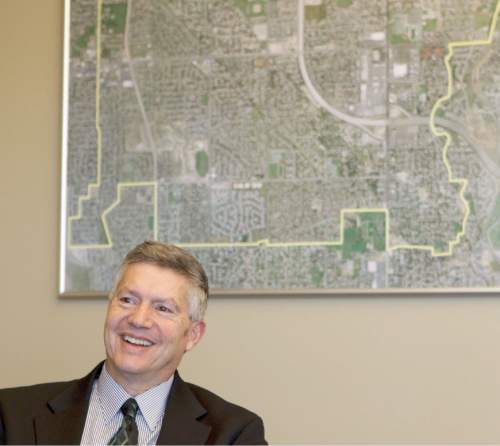This is an archived article that was published on sltrib.com in 2016, and information in the article may be outdated. It is provided only for personal research purposes and may not be reprinted.
It's fascinating to watch as out-of-state based groups and those with obvious special interests oppose legislative efforts to reduce sales tax rates for Utahns.
Within the past two weeks, op-eds have appeared in The Salt Lake Tribune from Americans for Tax Reform and Americans for Prosperity (D.C.-based special interest groups) which, through outright misstatements or willful ignorance, provided misinformation and misconceptions about efforts to reduce the state's overall sales tax rate while modernizing our tax code.
Let me address the myths that have been presented about Utah tax policy and the remote sales tax.
Firstly, it's a myth that any Utah lawmaker is trying to "tax the Internet." We are strong supporters of the Internet Tax Freedom Act, which bars federal, state and local governments from taxing access to the Internet and from imposing discriminatory taxes like bandwidth taxes and email taxes, or multiple taxes on electronic commerce. The Internet is an integral part of society, and the measures currently before the Utah Legislature have nothing to do with taxing the Internet. In fact, contrary to what was written, no new tax is even being proposed!
A basic principle of free-market economics is: If government must edge into the economy, then all taxpayers, all transactions and all businesses need to be treated the same. A book is a book — a phone is a phone, regardless of where or how you buy it, and under existing law taxes are owed. If this principle is not followed, the government essentially picks winners and losers.
In their 1992 Quill Corp. v. North Dakota decision, the Supreme Court challenged Congress to act on a federal level to resolve problem of treating transactions and retailers differently. But while the U.S. Senate has found the criteria of Quill satisfied and passed a bill, the House has failed to act on every legislative proposal.
Our own Rep. Jason Chaffetz has a bill to resolve this situation. However, with a Congress incapable of something as basic as passing a budget, the House has chosen not to act on Chaffetz's or the Senate passed bills for nearly three years now.
Outside special interest groups have chastised Utah for leading out on what is a 10th Amendment issue. Interesting that out of state groups are trying to tell Utah what its elected officials can or cannot do.
Additionally, requiring online businesses to collect and remit sales taxes at a state level isn't even a new concept. Half of all states have already implemented laws to this end and have over 2,700 companies voluntarily collecting.
Secondly, one op-ed misstated the scenario when it indicated that "those who look to online shopping for affordable prices and good deals would quickly be disappointed." It appears from statements in that op-ed and in materials sent to legislators that the author is advocating tax evasion! In fact, a number of online retailers advertise that they do not collect sales tax as an incentive to buy from them online to get an advantage over local retailers. Talk about unfairness to those in-town businesses that employ our family and neighbors.
I want to be clear about one thing: In Utah, we are not trying to pocket more money. In fact, 2013 Senate Bill 58, which I sponsored and was passed, requires the Legislature to reduce the state sales tax rate to make any funds from remote sales tax collection revenue neutral. We are ensuring that happens by lowering the overall tax rate to correspond to any increase we get from bringing in new revenue from online businesses. The lower overall tax rate benefits everyone.
In this Utah-led effort, we are exercising our 10th Amendment rights to act as we were designed, and be the "laboratories of democracy." We're working to reduce the rate of an already due tax for all Utah consumers, regardless of how or where they choose to purchase goods.
Sen. Wayne Harper is a Utah state senator from Taylorsville.



